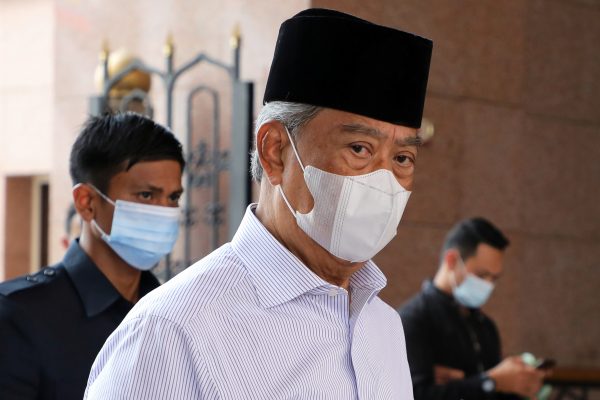Certainly, an electoral system engineered to produce victories for the incumbent coalition, and widespread curbs on civil liberties and the press were part of the formula. But just as in non-communist regimes elsewhere in Southeast Asia, political despots or their hegemonic parties relied on support from business and many citizens who benefited from the spoils of the pre-Asian Financial Crisis boom.
All too often, economic rents came in the form of patronage for favoured companies, industries or social groups. But so long as there was enough patronage to go around, its beneficiaries became contributors to the political and social stability that in turn made Southeast Asia a magnet for investment.
The Asian Financial Crisis laid waste to this formula in Indonesia, sinking the Suharto regime with it, but Malaysia’s then prime minister Mahathir Mohamad outplayed an opposition movement led by his former deputy Anwar Ibrahim.
It would take 20 years, and a begrudging reconciliation between Mahathir and Anwar, for Malaysia to get another chance for change. After the two men led the Pakatan Harapan coalition to victory against the corrupt Najib Razak in 2018, their challenge was to give Malaysians the democratic freedoms that they had only in part enjoyed under Barisan Nasional. Critically, this needed to include an economy that was fairer — especially towards Malaysia’s Chinese and Indian minorities — and less shaped by patronage and cronyism that lay under the cover of the affirmative action schemes aimed at helping the majority Malay population.
Malaysians got a taste of freedom with the post-2018 election window offering an exhilarating opportunity for free discussion of policy, critical media coverage and government engagement with civil society. But it was business as usual on the political economy front, with top jobs in the sprawling SOE sector going to government friends and continued favouritism for ethnic Malays.
Indeed, had the Pakatan Harapan government stayed in office, Malaysia might have transitioned to something like what emerged in Indonesia after 1998: a vibrant democracy at the grassroots, but one in which corruption and cronyism still thrived at the top. A reasonable compromise, many would grudgingly accept.
Malaysia wasn’t to find out. When current Prime Minister Muhyiddin Yassin formed a new government on the floor of parliament in 2020, it seemed that Malaysia quickly returned to the worst of both worlds — an even more intense patronage politics combined with a return to old patterns of harassment of activists and the press.
It’s tempting to say that Malaysia has returned to the pre-2018 status quo ante. But as William Case writes in our lead article this week, that would be to miss some significant structural shifts in Malaysian politics that predate the 2018 election and have only accelerated over the past two years of political turmoil and pandemic.
Whereas Malaysia’s political parties were among the strongest in Southeast Asia, politics is growing more personalised, factionalised and fluid as parties are hollowed out by internal rivalries and split by inducements for their parliamentarians to join one potential governing coalition or another.
The combination of this increasingly personalistic political culture with a parliamentary political system designed for strong, coherent parties creates real dysfunctions. Case argues that a new mode of power transfer has taken root, whereby leaders have competed stealthily for the loyalties of parliamentary defectors and mastery over back channels to state patronage.
The result is that Malaysia has a prime minister nobody voted for leading a government that nobody voted for. All the while, Muhyiddin’s own internal rivals seek to gain the numbers on the floor of parliament to replace him, with or without the bother of an election.
Not wanting to be given a taste of his own medicine, Muhyiddin sought to pull the ladder up after himself. In early January, Malaysia’s monarch declared a state of emergency after a spike in COVID-19 cases. Muhyiddin had previously appealed for a declaration of emergency but was knocked back. Both times it was a transparent attempt on Muhyiddin’s part to suspend parliamentary procedures, buying him time to consolidate power within his governing coalition as the threat of a no-confidence vote appeared imminent.
What’s more remarkable, Case suggests, is that Malaysia’s monarchs appear to have gladly taken on their new role as parliamentary king-makers. This is ‘an astonishing royal revival’ for a monarchy where previously the dominance of UMNO meant that hereditary rulers had negligible leverage to affect politics by exercising their constitutional prerogatives to appoint prime ministers. With razor-thin margins supporting the past two governments, the systemic role of the Malaysian monarchy is now a factor to watch very closely.
The old certainties of Malaysian politics are well and truly out the window, yet a new equilibrium is yet to emerge. That the fitful emergence of a ‘new normal’ is occurring in a once-in-a-century global pandemic makes the situation all the more difficult to predict. If one is looking for a picture of what Malaysian politics will look like in the years ahead, the country’s own history is probably an imperfect guide. Instead, Malaysia may well look more like the Southeast Asian norm than it ever has: a modernising economy paradoxically beset by a politics of personalism, patronage and arbitrary rule.
The EAF Editorial Board is located in the Crawford School of Public Policy, College of Asia and the Pacific, The Australian National University.

